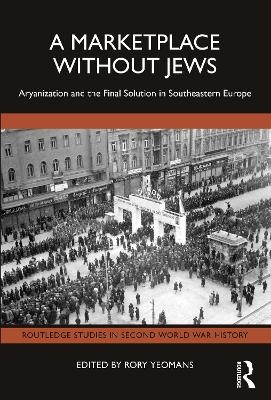
A Marketplace Without Jews
Routledge (Verlag)
978-1-032-76744-4 (ISBN)
This book examines the economics of everyday life and the Final Solution in Southeastern Europe, specifically the role that the mass confiscation of Jewish property and exclusion of Jews as well as other undesired population groups from the national marketplace in Southeastern Europe played in transforming economic life and social relations.
It aims to understand how ordinary people in the region responded as beneficiaries, bystanders, perpetrators, rescuers, and, above all, victims to Aryanization, and how regimes and governments adapted its basic principles to their specific national contexts and ideological and ethnic agendas. Aryanization appeared in some of its most radical, accelerated, and yet idiosyncratic forms in Southeastern Europe, representing a staging post or parallel process on the journey to the Final Solution. At the same time, it represented a modernizing project through which states on the periphery of Hitler’s new Europe could not only catch up with the rest of the continent but also seek to gain legitimacy among their own citizens by using systems of mass robbery to satisfy consumer demand and aspirations of social mobility in economies of want and scarcity.
This volume is aimed at scholars and students of the Second World War and European fascism, genocide and occupation politics, Jewish studies, and Southeastern Europe.
Rory Yeomans is a historian of modern European history. He has taught and held fellowships at numerous institutions and universities. His publications include Visions of Annihilation: The Ustasha Regime and the Cultural Politics of Fascism, 1941–1945 (2013).
Introduction: A Marketplace Without Jews: Occupation, Everyday Economics, and the Final Solution in Southeastern Europe Section 1: Architects, Planners, and Implementers of Aryanization 1. The Rise and Fall of an Aryanization Bank: The Romanian Credit Institute, 1941-1951 2. When Economics was a Racial Endeavour: The Aryanization of Jewish Stores and Businesses in Wartime Sarajevo 3. The Socioeconomics of the Final Solution in Bulgaria: A Case Study of the Commissariat for Jewish Affairs, 1942–1944 Section 2: Contestation, Competition, and Social Distance 4. Reluctant Beneficiaries of the Final Solution: Popular Responses to the Plundering of Jewish Property in Occupied Belgrade 5. Factory Purges and the Expertise Gap: How Aryanization Impeded the Construction of a “Model Workers’ Economy” in Wartime Croatia 6. “Crumbs from the Table”: Aryanization, Ethnic Competition, and the Final Solution in Wartime Osijek Section 3: Non-Jewish Aryanizations 7. Selective Resistance to Romanianization: The Coal Industry and National Minorities in the Jiu Valley, 1938–1943 8. Stealing from the “Undesired”: The Porajmos and the Plunder of Roma Property in the Independent State of Croatia 9. A Forgotten Aryanization: The Ustasha Regime, Middle-Class Serbs, and Economic Terror in Wartime Zagreb Section 4: The Challenges of Postwar Restitution and Accountability 10. “The Inhabitants Live in Our House Arbitrarily”: Confiscation and the Lack of Restitution in Hungary, 1944–1946 11. The Dispossessed: Bulgarian Jews and the “Trial of the Antisemites,” 1944–1945
| Erscheinungsdatum | 23.10.2024 |
|---|---|
| Reihe/Serie | Routledge Studies in Second World War History |
| Verlagsort | London |
| Sprache | englisch |
| Maße | 156 x 234 mm |
| Gewicht | 700 g |
| Themenwelt | Geschichte ► Allgemeine Geschichte ► Neuzeit (bis 1918) |
| Geschichte ► Allgemeine Geschichte ► 1918 bis 1945 | |
| Geisteswissenschaften ► Philosophie | |
| Sozialwissenschaften ► Politik / Verwaltung ► Politische Systeme | |
| Sozialwissenschaften ► Politik / Verwaltung ► Politische Theorie | |
| Sozialwissenschaften ► Soziologie ► Spezielle Soziologien | |
| ISBN-10 | 1-032-76744-8 / 1032767448 |
| ISBN-13 | 978-1-032-76744-4 / 9781032767444 |
| Zustand | Neuware |
| Haben Sie eine Frage zum Produkt? |
aus dem Bereich


